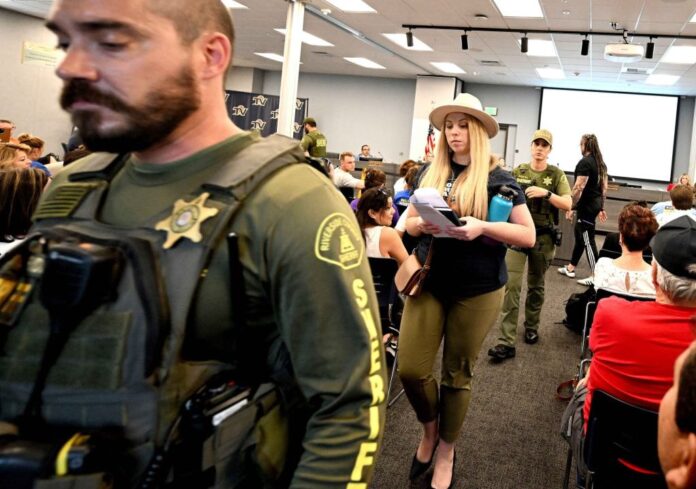In the past year, attendees have often been removed from Temecula school board meetings — sometimes escorted by sheriff’s deputies — for what board President Joseph Komrosky determined is disruptive behavior.
That practice has now led to a lawsuit that alleges some of the removals are illegal.
The ACLU Foundation of Southern California and the First Amendment Coalition filed a suit Thursday, Dec. 21, against the Temecula Valley Unified School District, its board of trustees and Komrosky. The lawsuit alleges they violated the First Amendment, which guarantees freedom of speech; the California Constitution; and the Brown Act, the state’s open-meeting law that gives the public the right to participate in local legislative meetings.
The nonprofit groups are representing two plaintiffs, Temecula residents Upneet Dhaliwal and Julie Geary, who both have been kicked out of meetings. Dhaliwal has a child in Temecula schools; Geary founded the Temecula Unity group and teaches in another district.
While presiding over meetings, Komrosky typically uses penalty cards before ejecting attendees.
“This case isn’t just about one heavy-handed (or card-waving) elected official,” First Amendment Coalition Executive Director David Snyder wrote in a Thursday email to members. “Public meetings are at the heart of civic engagement, and conduct like Komrosky’s chills speech and public participation, striking at the heart of our democracy.”
Jonathan Markovitz, free expression and access to government staff attorney for the ACLU of Southern California, in a Friday email echoed Snyder’s sentiment about the role of public participation in democracy, and said such rights are especially cherished in Temecula right now.
“The lawsuit is necessary because Mr. Komrosky cannot be permitted to violate those rights,” Markovitz wrote.
Komrosky and district spokesperson Jimmy Evans did not respond to requests for comment Friday, Dec. 22.
The Southern California New Group is a longtime member of and contributor to the First Amendment Coalition.
Temecula’s often-fiery school board meetings have drawn widespread attention since the election of conservative Christian board members Komrosky, Danny Gonzalez and Jen Wiersma. Board decisions frequently end in a 3-2 vote, with trustees Allison Barclay and Steven Schwartz often disagreeing with the conservative bloc.
Among other things, the majority has caused controversy by initially rejecting a social studies curriculum and citing concerns about its inclusion of gay activist Harvey Milk, banning critical race theory and adopting a parental notification policy requiring schools to tell parents if their student is transgender.
Gonzalez resigned Friday, Dec. 15, breaking up the conservative bloc, at least for now. A recall effort against Komrosky is underway.
RELATED: Signatures turned in to seek recall of one Temecula school board member
Public Counsel has since sued the district over the critical race theory ban and its parental notification policy.
Since the June 27 meeting, Komrosky has used penalty cards, a system borrowed from soccer and other sports, to eject people.
“This is not a public meeting for the public,” he said that day, after saying that the meeting is for the school board.
“Just to give you a snapshot of what happened last time, I had to warn 15 to 20 people, kick out five to six, and clear the auditorium,” he said June 27. Komrosky then explained the penalty cards: yellow is a warning, and red means “you’re out.”
At a July 18 meeting, those removed included teacher and Temecula parent Jennee Scharf, who called Gonzalez a homophobe; 412 Temecula Valley Pastor Tim Thompson, who called Schwartz a communist; and Geary, who spoke from the audience after speaker Chauncey “Slim” Killens — who was not shown a card — called the California Board of Education perverts and, referencing Bible scripture, threatened to “destroy” Gov. Gavin Newsom.
Killens, who lived in Winchester as of 2021, ran on a conservative Christian platform to replace Newsom during recall efforts. Geary asked why he wasn’t removed for making a threat.
“This is our meeting, not yours,” Komrosky told Geary, as four deputies surrounded her.
Barclay said Geary had a point.
“Joe, was that not a threat?” she asked Komrosky, who appeared to ignore her.
On Friday, Geary said she’s been removed from three school board meetings.
“I’m an educator, public education is deeply important to me,” she said of her continued participation.
Geary said it’s important that the district focus on students, not politics.
“We hope that Komrosky understands that violating people’s constitutional rights, freedoms and liberties is a serious issue, and we hope that he stops,” she said.
In August, the board’s conservative bloc approved a list of behaviors that could be “disruptive” and lead to removal from a session. The list includes, among other things: use of hate speech, obscenity and “similar conduct;” loud, profane and abusive language; speaking, whistling, clapping and stomping; and “efforts to engage other attendees for the purpose of creating a disruption.”
To some, the list raised concerns about free speech violations.
“I think we’re setting ourselves up for another lawsuit,” Schwartz told Komrosky at the meeting.
He’s been proven right.
The Brown Act allows people to be removed for causing disruptions.
A 2022 amendment, created in light of increasingly contentious public meetings, defines “disruptive behavior” as that which “actually disrupts, disturbs, impedes, or renders infeasible the orderly conduct of the meeting,” including a failure to comply with “reasonable and lawful regulations” and “the use of force or true threats of force.”
The lawsuit alleges that Komrosky confirmed during an Aug. 28 interview on the podcast “Point. Blank. Truth” that he doesn’t believe the “conventional First Amendment” applies to board meetings, and that he’s justified to expel people.
The lawsuit asks the court to declare that the defendants violated the laws in question, prevent them from continuing the behaviors — including enforcement of the “disruptive conduct” guidelines — and award the plaintiffs a nominal $1 fee for damages.






